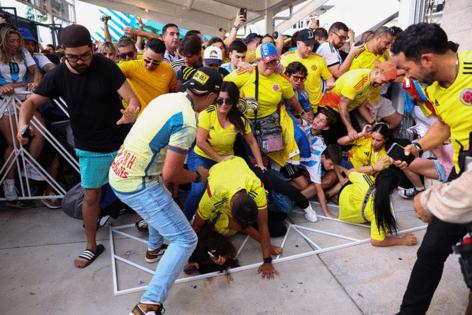Michelle Kaufman: What we learned for 2026 World Cup now that Euros, Copa America are over
Published in Soccer
MIAMI — As an action-packed month of international soccer draws to a close, the Euros and Copa America have disappeared from our TV screens and we're now left with indelible images of Lionel Messi-worshipping Argentine fans overtaking Times Square, a sea of orange Dutch fans marching to German stadiums, and Colombian yellow fever infecting crowds from Texas to California to North Carolina to South Florida, where the Copa culminated Sunday at Hard Rock Stadium.
We will remember Spanish phenom Lamine Yamal, who turned 17 on Saturday, scoring that spectacular goal against France, and England’s Jude Bellingham saving England with his last gasp 95th minute bicycle kick against Slovakia.
We will remember the relief and joy of the Argentine team when it survived a tense penalty kick shootout against Ecuador in the quarterfinals thanks to the heroics of Albiceleste goalkeeper Emiliano “Dibu” Martinez. We will remember Argentina raising the Copa trophy for a record 16th time after an extra time thriller against Colombia that left Messi hobbling with an ankle injury.
And, it will be hard to forget the dejected host U.S. national team, trudging off the field after being eliminated from the group stage on home soil.
Copa America 2024 was a dress rehearsal of sorts for the 2026 World Cup, which will be co-hosted by the United States, Canada and Mexico. It was a chance to gauge how teams from the Americas are looking with two years to go, and how many of the World Cup venues would fare.
This is what we learned:
Argentina is still a power, even when Messi is not at his best. Once upon a time, if Messi stumbled, his team faltered. That is no longer the case. Messi is obviously still the captain and leader of the team, on and off the field. He can still produce magical moments. The eight-time Ballon d’Or winner is revered by his teammates. It remains to be seen whether 37-year-old Messi will still be playing in two years, but the team proved it carry Messi, which will serve Argentina well as it aims to defend its World Cup title.
Colombia, Canada, Ecuador and Venezuela are on the rise.
Los Cafeteros of Colombia returned to the Copa America final for the first time in 23 years and rode a 28-game win streak into the championship game against Argentina. James Rodriguez is 32, but showed he still has the skills that made him the sensation of the 2014 World Cup. Coach Nestor Lorenzo has the team believing again, so watch out in 2026.
Canada made great strides under new American coach Jesse Marsch, despite him feeling that CONMEBOL and tournament organizers treated his team, and other non-South American teams, “like second-class citizens.” Nobody expected Canada to advance with Argentina from Group A, ahead of Chile and Peru. And fewer would have predicted Canada to reach the semifinals, but they did.
Ecuador and Venezuela gave fits to the traditionally strong teams, which gives them reason for hope heading to 2026.
The United States and Mexico have a lot of work to do. Once the locks to advance ahead of CONCACAF neighbors Canada and Panama, both fell short and lost in the group stage, despite relatively easy draws and an abundance of resources most teams in the region lack.
U.S. coach Gregg Berhalter was fired last week, as expected. He led the team to the knockout stage of the 2022 World Cup, and expectations were high for a roster dominated by players making a living in some of Europe’s top leagues. But Team USA fell flat after an easy win over struggling Bolivia, losing 2-1 to Panama (Tim Weah’s red card didn’t help) and 1-0 to Uruguay. A change was needed.
Whoever the next USA boss is will have a lot of pressure to right the ship. Former Liverpool coach Jurgen Klopp, the fan favorite, politely declined. Other potential foreign candidates include Marcelo Gallardo, Herve Renard, David Moyes, Joachim Low, and Jose Pekerman. Columbus Crew coach Wilfried Nancy has been mentioned. The frontrunner among U.S. coaches is Los Angeles FC coach Steve Cherundolo, who played for the U.S. team and spent his pro career in Germany. If I had to guess, I’d say they go with Cherundolo, which would make sense. But one of the others would offer fresh eyes and ideas that the team could use.
Argentina coach Scaloni complained about the condition of the temporary grass field at Mercedes-Benz Stadium after the Copa opener, and complaints continued from other coaches and players at other venues throughout the tournament. Uruguay coach Marcelo Bielsa was most vocal. Of the 14 Copa venues, six had artificial turf and required makeshift grass fields to be laid over the turf, including Mercedes-Benz Stadium, MetLife Stadium, and AT&T Stadium. All are NFL palaces with lots of fancy suites, but the field is most important to the world’s best soccer players. World Cup organizers must make sure the grass is laid down far in advance to avoid embarrassment.
Sadly, this tournament will also be remembered for the ugly images of a brawl in the stands at Bank of America Stadium in Charlotte and a chaotic, dangerous security breach by unticketed fans at Hard Rock Stadium on the night of the final. Although it was just two games the entire three weeks that had a major security issue, that is two too many. CONMEBOL fell short in this area, and we have to hope FIFA will do better in 2026. As a veteran of 37 years of sportswriting, 14 Olympics and six World Cups, that was the first time I witnessed anything like that. It can’t happen again.
Finally, the officiating at the Copa America was a constant source of controversy. It should not be that way. Part of the problem is that there was far too much diving and rolling around from players seeking calls. Too much arguing. Marsch said in defense of his Canadian players: “They’ve never berated referees, never rolled around on the ground like children looking for calls and yellows from referees.” Many of the Copa refs struggled to keep games under control. For fans watching Euro games, the contrast was stark. Players there had far more respect for the refs, who were in control and when they saw players dive, would wave them up and tell them to carry on. Copa refs deserve a yellow card for their performance, and some should be red-carded and ejected before 2026.
For now, back to MLS. Inter Miami plays at home Wednesday against Toronto. When will Messi return? Stay tuned.
©2024 Miami Herald. Visit miamiherald.com. Distributed by Tribune Content Agency, LLC.










Comments